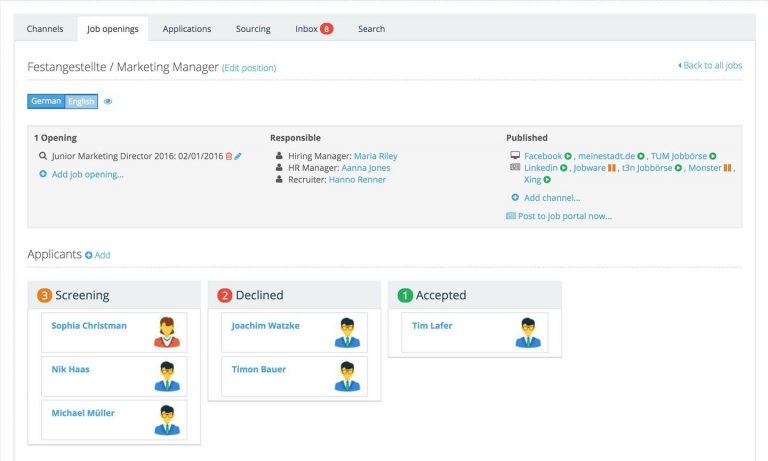What Do Employment Background Checks Include?

In this article, we’ll explain the ins and outs of background checks, their role in a successful recruitment process, best practices, what exactly they should include and what you as a HR function need to know about doing them compliantly.
Key Facts
Background checks help organisations to avoid hiring applicants with fabricated work experience.
Most organisations verify the same information, but certain sectors like the financial and security industries must check specific documentation.
Background checks need to comply with Data Protection laws.
What Is a Background Check?
A background check is a pre-employment applicant screening process that validates the information presented on a candidate’s CV, such as work or education history.
Why Are Background Checks Used?
Background checks help employers gain a more accurate picture of the people they are considering bringing into their organisation. It also helps avoid any trouble down the line caused by dishonesty on a CV or in a job interview, like a falsified college degree or professional licence.
The Role of Background Checks in the Recruitment Process
Performing a background check can help organisations avoid hiring candidates who don’t have the background they say they do. Since this could lead to unqualified people filling essential positions, it’s vital for companies to perform background checks on potential employees.
There are 10 background checks that organisations can perform throughout the recruitment process, listed below:
Right to Work Check. This confirms a candidate’s right to work in the UK or within the country you are hiring in by checking their passport, immigration status form or other documentation.
Criminal Record Check. Also called a Disclosure and Barring Service (DBS) check, these look into a candidate’s past criminal record, including cautions, warnings and convictions.
Employment References. This checks a candidate’s prior experience with the role they are applying for. They’re used to confirm an employee’s status at that organisation and offer insight into their day-to-day performance in that role.
Educational References. This confirms a candidate’s education history by contacting the educational institutions listed on their CV.
Credit Check. A credit check reviews a candidate’s financial history and current financial situation so employers can assess if a candidate is a risk to the company.
DVLA Check. Short for Driver Vehicle and Licensing Agency, this check confirms the validity of a candidate’s licence if they’re applying for a position where driving is required.
Social Media Screening. A background check implemented with Facebook, Twitter and other social media profiles, this investigates a candidate’s social media presence to determine if they display anti-social behaviours.
Medical Check. This confirms that the candidate is in good health for positions that require a lack of medical issues or certain levels of fitness.
International Sanctions Check. This determines if a candidate is associated with terrorism, animal rights abuse, arms dealing, war crimes and similar abhorrent behaviour. Police organisations and political parties most commonly perform this check.
UK Sanctions Check. Organisations run this when hiring individuals who’ve previously run a company. It checks whether they’ve been involved in fraudulent activities or if stocks were involved, they continued trading while their company went under.
Easily Track Your Most Successful Recruiting Channels

Create application forms in a flash and let candidates enter through which channel they became aware of you. Analyse this data in Personio and optimize your recruiting accordingly.
Learn more hereExamples of Background Checks by Sector
Most organisations do perform checks on the people they recruit, but certain industries have it as an essential requirement. As a result, their checks are more thorough and may require additional specialised screening.
For example, the financial industry requires the typical documentation that validates prior experience, identity and criminal record. However, it also emphasises registering with the Financial Conduct Authority (FCA). This organisation regulates financial firms to keep the market honest, competitive and fair.
The security industry has similar practices, with their background checks verifying experience, identity and criminal record while also looking for certification from the Security Industry Authority (SIA). An SIA licence signifies that the applicant is familiar with and will follow the BS7858 standard that the organisation sets.
Background Check Process: Example
While running a background check, you’ll need to do several specific things as an employer in order to comply with Data Protection Laws. Below is the exact process you should follow:
1. Have a Reason to Do the Background Check
The process of collecting private information needs to have a clear purpose that’s communicated clearly to each applicant. Vague purposes to gather someone’s information can often signify a fraudulent business or an attempt at identity theft.
2. Get Consent From the Applicant
An applicant needs to consent to the background check before it’s performed. As mentioned above, they need a clear understanding of what they agree to, so as a recruiter, you should never just assume consent.
3. Make the Data Accessible
Ensure that the applicant has easy access to the information that you gather, so they know what you’ve learned. Additionally, if the background check isn’t favourable, explain why you might have rejected them.
4. Store the Date Securely
Keep the information in a safe place so that no one with bad intent can get their hands on it. Put protocol in place to discard this information safely when appropriate.
Frequently Asked Questions About Background Checks
What Is a Background Check?
It’s an applicant screening process that verifies the details they have included on their CV, such as educational level or work history.
What Should I Look For in a Background Check as a Recruiter?
During background checks, recruiters typically look for:
Right-to-work verification
Criminal records
Employment references
Educational references
Financial history
Social media profiles
What Would Make Someone Fail a Background Check?
The most common ways for people to fail their background checks are due to inconsistencies in their employment history, their CVs and undisclosed financial trouble such as bankruptcy or overdue loans.
How Long Does a Background Check Take?
The average time needed to perform a full background check on an applicant is typically three to five days.
Keep Applicant Data Safe with Personio
You can collect a lot of information during an applicant’s background check and it’s vital that it’s kept safe and confidential. Personio makes storing data easy with its secure digital personnel file that others can only access if you permit them to do so. Book your free demo today and learn how else Personio’s holistic HR software can help your business.
Disclaimer
We would like to inform you that the contents of our website (including any legal contributions) are for non-binding informational purposes only and does not in any way constitute legal advice. The content of this information cannot and is not intended to replace individual and binding legal advice from e.g. a lawyer that addresses your specific situation. In this respect, all information provided is without guarantee of correctness, completeness and up-to-dateness.


